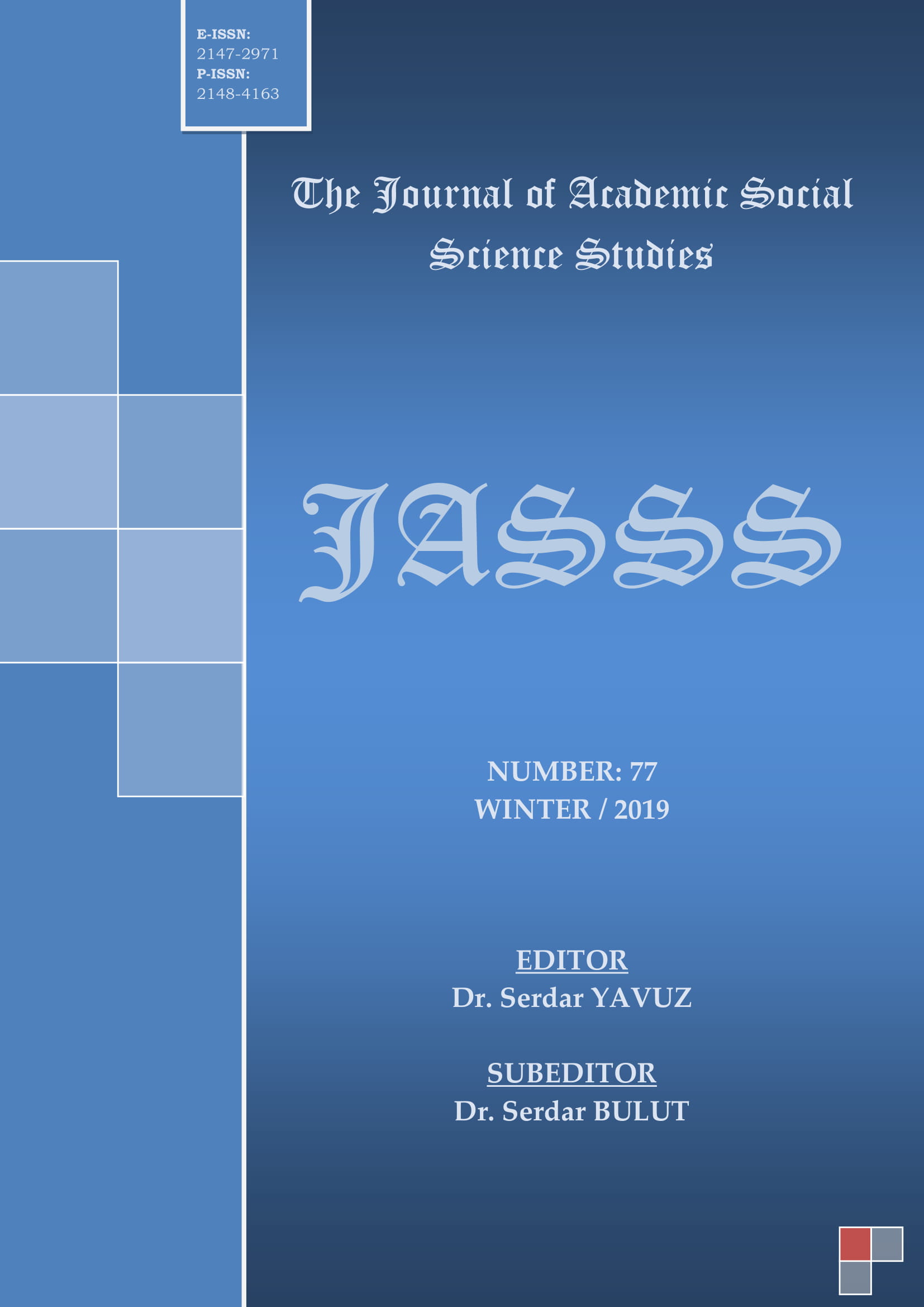ÖĞRETMENLERİN DÜŞÜNME BECERİSİ ÖĞRETİMİNE YÖNELİK ÖZYETERLİK ALGILARININ ÇEŞİTLİ DEĞİŞKENLER AÇISINDAN İNCELENMESİ
Author :
Abstract
Bu çalışmanın amacı sınıf öğretmenlerinin düşünme becerisi öğretimine yönelik özyeterlik algılarının belirlenmesidir. Araştırmanın örneklemini 2015-2016 eğitim-öğretim yılında Elazığ ilinde yer alan beş farklı eğitim bölgesinden 186 sınıf öğretmeni oluşturmaktadır. Her eğitim bölgesinden iki okul çalışma için seçilmiştir. Çalışmada veri toplama aracı olarak Dilekli ve Tezci (2015) tarafından geliştirilen “Öğretmenlerin Düşünme Becerilerinin Öğretimine Yönelik Özyeterlik Algısı Ölçeği” (DBÖA) kullanılmıştır. Ölçek sekiz maddeden oluşan “akademik yetkinlik”, sekiz maddeden oluşan “uygulama” ve dört maddeden oluşan “tasarlama” alt boyutlarından meydana gelmektedir. Toplam 20 maddeden oluşan ölçeğin geneline yönelik olarak hesaplanan Alpha güvenirlik katsayısı ise .95’tir. Öğretmenlerin düşünme becerilerinin öğretimine yönelik özyeterlik algıları cinsiyet, eğitim durumu, mezun olunan okul/fakülte ve mesleki kıdem değişkenlerine göre değerlendirilmiştir. Ölçekten elde edilen verilerin analizinde bağımsız gruplar t-testi, Kruskal Wallis H, Mann Whitney U ve tek yönlü varyans analizi (ANOVA) istatistik teknikleri kullanılmıştır. Araştırmadan elde edilen bulgulara göre hem kadın hem de erkek öğretmenlerin düşünme becerisi öğretimine yönelik özyeterlik algı düzeylerinin yeterli olduğu sonucuna ulaşılmıştır. Yüksek lisans mezunu öğretmenlerin düşünme becerisi öğretimine yönelik özyeterlik algıları lisans mezunu öğretmenlere göre daha fazla olduğu sonucuna ulaşılmıştır. Ayrıca en yüksek özyeterlik algısı 1-5 yıl mesleki kıdeme sahip öğretmenlerde görülürken en az özyeterlik algısının 21 ve üzeri yıl mesleki kıdeme sahip öğretmenlerde olduğu belirlenmiştir.
Keywords
Abstract
The aim of the study is to determine self-efficacy perceptions of the primary school teachers towards teaching thinking skills. The sample of the study consists of 186 primary school teachers working at five different educational districts of Elazığ city in 2015- 2016 academic year. Two schools from each educational districts were selected for the study. “Teachers' Self-Efficacy Towards Teaching Thinking Skills Scale” prepared by Dilekli and Tezci (2015) was used as data collection tool in the study. The scale consists of the sub dimensions; “academic competence” consisting of eight items, “practice” consisting of eight items and “designing” consisting of four items. The alpha reliability coefficient was .95. for the overall scale consisting of 20 items. Self-efficacy perceptions of teachers' towards teaching thinking skills were evaluated according to teachers’gender, educational status, graduated school / faculty and professional seniority variables. Independent groups t-test, Kruskal Wallis H, Mann Whitney U and one way ANOVA statistical techniques were used were used for the analysis of the data. According to the findings of the research, it was concluded that both male and female teachers had sufficient levels of the self-efficacy perception towards teaching thinking skills. The level of master graduated teachers' self-efficacy perceptions towards teaching thinking skills is higher than the level of graduated teachers’. Also it was determined that the highest self-efficacy perception was observed for the teachers with 1-5 years of professional seniority, and the least self-efficacy perception was observed for the teachers with 21 years and over of professional seniority.
Keywords
- Akbıyık, C. ve Kalkan Ay, G. (2014). Okul Öncesi Yönetici ve Öğretmenlerin Düşünme Becerilerinin Öğretimine Yönelik Algıları: Bir Durum Çalışması. Hacettepe Üniversitesi Eğitim Fakültesi Dergisi, 29(1): 01-18.
- Akbıyık, C. ve Seferoğlu, S.S. (2006). Eleştirel Düşünme Eğilimleri ve Akademik Başarı. Çukurova Üniversitesi Eğitim Fakültesi Dergisi, 3(32): 90-99.
- Baysal Z. N.; Çarıkçı, S. ve Yaşar, E. B. (2016). Sınıf Öğretmenlerinin Düşünme Becerileri Öğretimine Yönelik Farkındalıkları. Eğitimde Nitel Araştırmalar Dergisi, 5(1): 7-28.
- Bektaş, M.; Dinçer, Ş. ve Ayvaz, A. (2012). Sınıf Öğretmenlerinin Eleştirel Düşünme Becerisi Öğretimine İlişkin Görüşleri. International Journal of Social Science, 5(7): 163-175.
- Büyüköztürk, Ş. (2013). Sosyal Bilimler İçin Veri Analizi El Kitabı. Ankara: Pegem Akademi Yayıncılık.
- Cotton, K. (1991). Close-Up #11: Teaching thinking skills. Erişim tarihi: 10 Mart 2019, https://educationnorthwest.org/sites/default/files/TeachingThinkingSkills.pdf
- Crossland, J. (2015). Thinking Skills and Bloom's Taxonomy. PrimaryScience, 140: 32-34.
- Çubukçu, Z. (2004). “Öğretmen Adaylarının Düşünme Stillerinin Öğrenme Biçimlerini Tercih Etmelerindeki Etkisi”, XIII.Ulusal Eğitim Bilimleri Kurultayı, 6-9 Temmuz, İnönü Üniversitesi, Malatya.
- Demirel, Ö. (2010). Kuramdan Uygulamaya Eğitimde Program Geliştirme (12. Baskı), Ankara: Pegem Akademi Yayıncılık.
- Dilekli, Y. (2015). Öğretmenlerin Düşünmeyi Öğretmeye Yönelik Yaptıkları Sınıf İçi Uygulamalar, Özyeterlik Düzeyleri ve Öğretim Stilleri Arasındaki İlişki, Yayımlanmamış Doktora Tezi, Balıkesir Üniversitesi Sosyal Bilimler Enstitüsü, Balıkesir.
- Dilekli, Y. ve Tezci, E. (2015). Öğretmenlerin Düşünme Becerisi Öğretimine Yönelik Özyeterlik Algısı Ölçeği Geçerlik ve Güvenirlik Çalışması, The Journal of Academic Social Science Studies, 38: 135153.
- Doğanay, A. ve Yüce, S.G. (2010). Öğrencilerin Düşünme Becerilerinin Geliştirilmesinde Rehberli Yardım: Bir Öğretmenin Sözel İfadelerinin Analizine İlişkin Durum Çalışması, Kuram ve Uygulamada Eğitim Yönetimi Dergisi, 16(2): 185-214.
- Ekinci, Ö. ve Aybek, B. (2010). Öğretmen Adaylarının Empatik ve Eleştirel Düşünme Eğilimlerinin İncelenmesi, İlköğretim Online, 9(2): 816-827.
- Ersözlü, Z.N. ve Kazu, H. (2011). İlköğretim Beşinci Sınıf Sosyal Bilgiler Dersinde Uygulanan Yansıtıcı Düşünmeyi Geliştirme Etkinliklerinin Akademik Başarıya Etkisi, Uludağ Üniversitesi Eğitim Fakültesi Dergisi, 24 (1): 141-159.
- Frensch, P.A. and Funke, J. (2005). Thinking and problem solving. Erişim tarihi: 11 Ocak 2019, https://www.researchgate.net/publication/37367052_Thinking_and_problem_solving
- Gelen, İ. (2002). Sınıf Öğretmenlerinin Sosyal Bilgiler Dersinde Düşünme Becerilerini Kazandırma Yeterliklerinin Değerlendirilmesi, Çukurova Üniversitesi Sosyal Bilimler Dergisi, 10(10): 100-119.
- Güneş, F. (2012). Öğrencilerin Düşünme Becerilerini Geliştirme, Türklük Bilimi Araştırmaları (TÜBAR), 32: 127-146.
- Karasar, N. (2003). Bilimsel Araştırma Yöntemi (12. Baskı), Ankara: Nobel Yayın Dağıtım.
- Polat, S. (2014). Eleştirel Düşünme Becerisi Öğretiminin Çok Yönlü İncelenmesi, Yayımlanmamış Doktora Tezi, Necmettin Erbakan Üniversitesi Eğitim Bilimleri Enstitüsü, Konya.
- Sevinç, M. ve Tok, E. (2010). Düşünme Becerileri Eğitim Programının Okul Öncesi Öğretmen Adaylarının Düşünme Becerilerine İlişkin Görüşlerine Etkisi, e-Journal of New World Sciences Academy,5(3): 875-891.
- Şahin, Ç.; Çakmak, N. ve Hacımustafaoğlu, M. (2015). Akademisyenlerin Eleştirel Düşünme Becerilerinin ve Eleştirel Düşünme Becerileri Hakkındaki Görüşlerinin İncelenmesi, İnönü Üniversitesi Eğitim Fakültesi Dergisi, 16(2): 51-66.
- TDK, (2018). Güncel Türkçe Sözlük. Erişim tarihi: 14 Mart 2018, http://www.tdk.gov.tr/index.php?option=com_gts&arama=gts&guid=TDK.GTS.56e7c247c58835
- Yaman, S. ve Yalçın, N. (2005). Fen Bilgisi Öğretiminde Probleme Dayalı Öğrenme Yaklaşımının Yaratıcı Düşünme Becerisine Etkisi, İlköğretim Online, 4(1): 42-52.
- Yılmaz, N.Y. (2018). Düşünme Becerilerine İlişkin Lisansüstü Tezlerin İncelenmesi. Uluslararası Eğitim Bilimleri ve Öğrenme Teknolojileri Dergisi, 1(1): 32-38.





